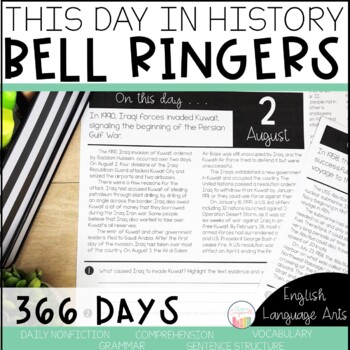This Day in History Full Year Bell Ringers | Daily Language | Morning Work
- Zip

What educators are saying
Products in this Bundle (13)
showing 1-5 of 13 products
Also included in
- Help your middle school students learn about important events in history, while also honing their reading, grammar, punctuation, and more with nonfiction language arts morning work / bell ringer activities. This listing is a mega-bundle of all of my This Day in History Products. Each is listed belowPrice $50.00Original Price $88.50Save $38.50
Description
Teach middle school? Save time in your day by having students practice comprehension, grammar, sentence structure, vocabulary, and more all while also reading nonfiction historical events for morning work.
This Day in History Bell Ringers is one page for students to complete every day of the year as daily reading warm ups. Students read the nonfiction passage that is based on a historical event that happened that same day in history. Then they answer 2-4 questions (depending on the day) about the passage. These questions range from reading comprehension, grammar, sentence structure, etc. Students can complete the whole thing individually and then you can go over it with them when they are done.
The topics are aligned to Common Core Standards for grades 5-7, though 8th grade could complete it as a review. I would caution using this product for any student below 5th grade as the historical topics can sometimes be a bit heavy.
As with my This Day in History Calendar, these topics cover world-wide events; however, the focus is more on American history than any other country and would probably be best for American schools.
⭐ Digital Option: The morning work is now available in Google Forms. Simply assign the page to your students in Google Classroom or a compatible platform and your students can fill out the answers. Multiple choice answers are self-checking, though the other answers will need to be graded. The link for Google Forms is located in the product on page 2.
What's Included?
-366 pages - one for each day in the year (+ leap year)
- complete answer key
Spiral Topics Reviewed (May, June, July and August contain only the review topics and no new content)
- basic parts of speech
- punctuation
- comprehension questions
- using text evidence
- using context clues
- multiple meaning words
- subjects and predicates
- rearranging sentences
- prefixes and suffixes
- root words
- proper and possessive nouns
- writing a timeline
- italicized titles
- hyphens and dashes
- main idea and details
New Topics for September:
- independent and dependent clauses
- direct objects
- transitive and intransitive verbs
- subject and predicate
- conjunctions, including coordinating and subordinating
- simple, compound, complex, and compound-complex sentences
- appositives
New Topics for October:
- simple verb tenses
- perfect and progressive verb tenses
- appositive phrases
- verb phrases
- linking and helping verbs
- preposition
- prepositional phrases
New Topics for November
- pronoun
- antecedent
- personal pronoun
- subject and object pronouns
- possessive pronouns
- reflexive and intensive pronouns
- indefinite pronouns
- adjectives
- comparative and superlative adjectives
- coordinate adjectives
December is a review month
New Topics for January
- adverbs (positioning and which questions it answer)
- different uses for commas
- adjective or adverb?
- adverb or preposition?
- commas in sentence structure
New Topics for February
- emphasis on different types of punctuation and their uses
- articles (a, an, the)
- definite and indefinite articles
- emphasis on vocabulary - multiple meaning words, suffixes, etc.
New Topics for March
- difference between clauses and phrases
- phrases - prepositional, noun, appositive, verb, participial, gerund, infinitive
- vague pronouns
New Topics for April
- what are modifiers?
- types of modifiers
- demonstratives and determiners
- emphasis on finding parts of speech of all the words in the sentence
- homophones and homographs
May is a review month.
June is a review month.
Please see the preview file for more details. Please note: This is a pdf file and is not editable.
Would you like to use these same topics as a calendar bulletin board in your classroom? See these products below:






